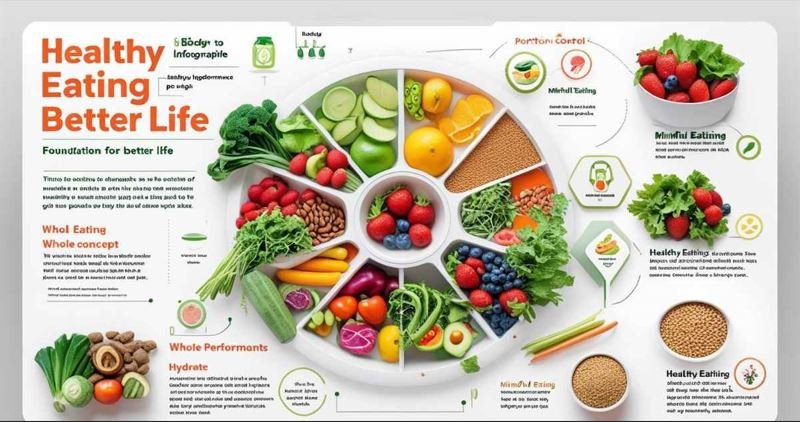Healthy Eating Habits: Transform Your Life with Every Bite
Introduction – Why Healthy Eating Is the Foundation of a Better Life
Picture your body as a high-performance engine. Just as premium fuel keeps a sports car running smoothly, the quality of your food determines how efficiently your body functions.
Yet, in our fast-paced modern world, we often treat eating as an afterthought, grabbing whatever’s quick and convenient — even if it lacks nutrition.
Healthy eating habits are not about restriction or fad diets. They are about nourishing your body consistently so it can perform, recover, and thrive. Whether you’re a student wanting more focus, a professional aiming for higher productivity, or someone simply wanting to feel better every day, your eating habits shape your health destiny.
This guide will take you through the definition, origins, science, real-world applications, comparisons, future trends, best practices, and FAQs — all designed to help you build eating habits that last a lifetime.
Definition – What Are Healthy Eating Habits?
Healthy eating habits are consistent dietary choices that balance nutritional needs with enjoyable eating. They involve:
- Consuming a variety of foods to cover all nutrient requirements
- Prioritizing whole, minimally processed ingredients
- Practicing portion control
- Staying hydrated daily
- Aligning calorie intake with energy expenditure
- Eating mindfully and avoiding emotional overeating
The goal is not perfection but sustainability. Healthy eating should fit into your life naturally, not feel like a constant battle.
Origin and Philosophical Background
Healthy eating isn’t a modern invention — it has deep historical and cultural roots.
Ancient Greece
Hippocrates, the “Father of Medicine,” believed food could heal or harm depending on how it was chosen and prepared.
Ayurveda (India)
Ayurvedic principles teach that food should balance the body’s doshas (energetic constitutions). Meals are tailored to the individual’s physical and emotional needs.
Traditional Chinese Medicine
Food is categorized by temperature and energy properties, aiming to keep yin and yang in balance for overall wellness.
Indigenous Wisdom
Many indigenous cultures used seasonal, local foods rich in nutrients, avoiding excessive processing and additives.
Modern nutrition science validates much of this ancient wisdom, proving that diet quality directly impacts health outcomes.
The Science Behind Healthy Eating Habits
Nutrition research reveals that diet is one of the strongest determinants of long-term health.
Here’s why:
- Macronutrients (carbohydrates, proteins, fats) supply energy and building blocks for body tissues.
- Micronutrients (vitamins, minerals) regulate metabolism, immunity, and brain function.
- Fiber supports gut health, digestion, and blood sugar stability.
- Hydration is essential for circulation, temperature control, and organ function.
A balanced diet reduces risks of obesity, type 2 diabetes, cardiovascular disease, certain cancers, and mental health issues.
Real-World Applications Across Multiple Sectors
1. Education
Schools with healthy meal programs see improved student focus, fewer sick days, and higher academic performance.
2. Corporate Workplaces
Companies that provide nutrition counseling and healthier cafeteria options report increased productivity and employee satisfaction.
3. Healthcare
Doctors use diet plans as primary treatment for obesity, hypertension, and diabetes, sometimes reducing or eliminating the need for medication.
4. Sports & Fitness
Athletes rely on tailored nutrition to optimize muscle growth, endurance, and recovery.
5. Technology
AI-powered nutrition apps guide users toward healthier choices by tracking calorie and nutrient intake in real time.
Comparison – Healthy vs. Unhealthy Eating Habits
| Healthy Eating Habits | Unhealthy Eating Habits |
|---|---|
| Whole foods like fruits, vegetables, lean proteins | Processed snacks and sugary beverages |
| Regular meal timing | Skipping meals and binge eating |
| Mindful, slow eating | Eating distractedly in front of screens |
| Adequate hydration | Excess caffeine and sugary sodas |
| Balanced portions | Oversized servings and frequent overeating |
Think of it like tending a garden: good habits nourish your health like water and sunlight, while poor habits let weeds take over.
Future Implications – Ethics, Risks, and Opportunities
Ethics
With the rise of genetically modified foods and lab-grown meats, ethical debates about transparency, safety, and environmental impact are intensifying.
Risks
Increased consumption of ultra-processed foods and targeted junk food marketing threaten public health, especially among children.
Opportunities
Personalized nutrition based on genetic testing, urban agriculture, and AI-driven diet coaching could revolutionize eating habits worldwide.
Best Practices for Building Healthy Eating Habits
1. Start Gradually
Make one change at a time — like replacing sugary drinks with water.
2. Plan Your Meals
Use meal prep to avoid last-minute unhealthy choices.
3. Eat a Rainbow
Include different colored fruits and vegetables for diverse nutrients.
4. Balance Your Plate
Aim for 50% vegetables, 25% lean protein, and 25% whole grains.
5. Control Portions
Using smaller plates and bowls can help control portion sizes naturally.
6. Limit Added Sugars
Follow WHO guidelines to keep added sugars under 10% of daily calories.
7. Stay Hydrated
Drink at least 2–3 liters of water daily.
Cultural and Lifestyle Adaptations
Healthy eating is not one-size-fits-all.
Mediterranean diets focus on olive oil, fish, and fresh produce; Japanese diets emphasize seafood, rice, and fermented foods; African diets often include root vegetables, legumes, and leafy greens.
Adapting healthy eating principles to your cultural preferences makes them more sustainable.
Metaphors & Analogies
Think of your body as a smartphone. You can have the best apps (skills, talents, ideas), but if your battery is low (poor nutrition), nothing works efficiently.
Food is your charger, and healthy eating keeps your battery at 100%.
Conclusion – Food as an Investment in Your Future
Your eating habits are like a long-term investment account. Every healthy choice is a deposit into your health bank, paying dividends in energy, resilience, and longevity.
Healthy eating is not about short-term gains but about creating a life where you feel good every single day.
FAQs – Simplified Answers
1. What is the easiest healthy eating habit to start with?
Drink more water and add a fruit or vegetable to each meal.
2. Can I still eat fast food occasionally?
Yes — balance is key. Just keep it as an occasional treat.
3. How do I know if I’m eating enough protein?
Track your intake; most adults need about 0.8–1.2 g per kg of body weight daily.
4. Is skipping breakfast bad?
Not necessarily, but if you skip meals, ensure your other meals are balanced.
5. How can I avoid late-night snacking?
Have a healthy dinner, stay hydrated, and keep tempting snacks out of reach.




